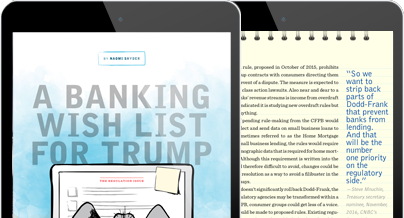
A Banking Wish List for Trump
This story includes the following:
- The complete elimination of the Dodd-Frank Act will be hard to do.
- It will be easier for the Trump administration to impact change by nominating new heads of agencies.
- Regulations could be changed to lighten the compliance burden on small banks.
What would Dennis Nixon, the chairman of International Bancshares Corp., in Laredo, Texas, most like to change about the Dodd-Frank Act? Its entire existence.
The Durbin amendment alone costs the company’s four chartered banks about $25 million in revenue per year. That’s the part of the Dodd-Frank Act that limits the amount banks over $10 billion in assets can charge in debit interchange fees. IBC is about a $12 billion asset bank holding company. Nixon, who is chief executive officer of one of the four charters, International Bank of Commerce in Laredo, Texas, says his bank has also suffered under the weight of Dodd-Frank’s new mortgage rules and some 14,000 pages of regulations that have been issued so far. Much of his time is spent just keeping up with regulations, not taking care of customers. “It should have never been passed,” he says. “It’s the cause of the destruction in community banking.”
Whether or not you agree with him, the end of Dodd-Frank seems unlikely. Congress would have to pass a new law, and there probably aren’t enough votes in the Senate to end the Dodd-Frank Act.
As this issue was prepared for publication, House Financial Services Chairman Jeb Hensarling, R-Texas, was planning a financial reform bill. Still, the Trump administration doesn’t need Congress to make a lot of changes. Trump signed an executive order asking the U.S. Treasury Secretary to look for ways to rollback Dodd-Frank. New leadership of various regulatory agencies could take a softer approach to supervision, perhaps not right away, but in the years ahead. Regulations that have been proposed but not yet finalized, such as the arbitration proposal from the Consumer Financial Protection Bureau (CFPB), could be shelved and even rewritten. Bank Director digital magazine has put together a list of options that are both high on bankers’ wish lists for change and also most likely to get done.
“It’s not entirely clear what the priorities are going to be,” says David Freeman, Jr., a partner in the law firm Arnold & Porter LLP in Washington, D.C. Freeman.
New Heads of Agencies
Probably the most likely to change is the tenor at the top of several agencies. “How you interpret makes a lot of difference,” says John Allison, the former CEO of BB&T Corp., who was reported to be a candidate for U.S. Treasury Secretary in the Trump administration. (Trump chose former Goldman Sachs investment banker Steven Mnuchin instead.) “The regulators make the law, unfortunately, to a large degree,” Allison says. The Trump administration will get to name a new head for the Securities and Exchange Commission (SEC) since Mary Jo White left. There also are three vacancies on the Federal Reserve Board of Governors and three on the SEC, including White’s seat, which will need confirmation from the U.S. Senate. This new leadership could change the way the agencies enforce existing rules. For example, the SEC could soften the impact on banks of the Volcker Rule, which limits banks’ ability to do proprietary trading, says Brian Gardner, a bank analyst at Keefe, Bruyette & Woods. However, a change in the heads of most of the federal agencies may be years away. Federal Reserve chairman Janet Yellen has not indicated she is stepping down. “We’re a year away from the Federal Reserve making significant regulatory moves,” Gardner says. And CFPB Director Richard Cordray’s term lasts until mid-2018, although there is talk that Trump might seek to remove him early.
A New, Bipartisan Commission for the CFPB
High on the list of things that make some bankers’ blood boil is Cordray and the CFPB. A frequent point of contention is the complaint that the agency makes rules through enforcement action, and offers inadequate guidance on what banks are supposed to do. The agency has declined to define, for example, what an “abusive” practice is under the Dodd-Frank Act. Unlike other federal banking agencies charged first and foremost with the safety and soundness of the banking system, this agency spends all its time, and the work of its roughly 2,000 employees, figuring out how to regulate for the benefit of consumers. Like the Dodd-Frank Act that created it, the CFPB is unlikely to go away anytime soon. Republicans would like to do away with the sole directorship structure and appoint a bipartisan commission to head the agency instead, which would give Republicans more power to oversee the agency’s rules and regulations. They have been emboldened by a recent U.S. federal judge’s decision stating that the leadership structure was unconstitutional, but the CFPB has appealed that ruling, and it could take an act of Congress to change it. “As long as Cordray is there, the incoming administration and Congress don’t have much authority,” says Gardner. “The CFPB has broad authority to do whatever it pleases.”
Relief for Small Banks
Perhaps easier to get passed in Congress than a change at the CFPB would be regulations that would lighten the compliance burden for small banks. In addition to new mortgage disclosure forms, small banks have been contending with the safe harbor provisions of the qualified mortgage rule for a few years now. To avoid getting sued by borrowers, banks must follow strict rules for the types of mortgages they offer. After the financial crisis, the rules were designed to keep banks from making poorly underwritten mortgages and then packaging them as securities to be sold to unwary investors, which was a factor that contributed to the financial crisis. Paul Merski, group executive vice president charged with lobbying for the Independent Community Bankers of America, says relief for small banks might involve changing the rules so that if small banks chose to keep certain mortgages in their portfolios and not sell them on the secondary markets, they could still keep the safe harbor provisions. Thousands of banks have been impacted by this, he says.
Also, banks with assets of $50 billion or more have been hit with more stringent regulations under the Dodd-Frank Act, such as mandatory stress testing, and there is some support in Congress to raise the asset level, Freeman says. “It’s incredibly costly,” he says.
Changes to Arbitration and Overdraft Agreements
It would be vastly easier for new leadership to change pending regulation than regulation already enacted. Still pending with an uncertain future are the CFPB’s proposed guidelines on arbitration clauses and expected changes to overdraft rules. Both of these items are pretty important to community banks, says Richard Fischer, a senior partner for Morrison & Foerster in Washington, D.C. The arbitration rule, proposed in October of 2015, prohibits banks from writing up contracts with consumers directing them to arbitration in the event of a dispute. The measure is expected to cause an increase in class action lawsuits. Also near and dear to a lot of community banks’ revenue streams is income from overdraft fees. The CFPB has indicated it is studying new overdraft rules but has yet to propose anything.
Another piece of pending rule-making from the CFPB would require banks to collect and send data on small business loans to the government. Sometimes referred to as the Home Mortgage Disclosure Act for small business lending, the rules would require much of the same demographic data that is required for home mortgages, says Merski. Although this requirement is written into the Dodd-Frank Act and therefore difficult to avoid, changes could be attached to a budget resolution as a way to avoid a filibuster in the U.S. Senate, Merski says.
Even if Congress doesn’t significantly roll back Dodd-Frank, the tone at the top of regulatory agencies may be transformed within a few years. At the CFPB, consumer groups could get less of a voice. Delays or changes could be made to proposed rules. Existing regulations could be interpreted more favorably for banks. A lot of that is very possible, and even probable, at this stage.
“If I had a magic wand, I’d get rid of the Dodd-Frank Act,” Allison says. “I don’t think that’s going to happen. I think you will see a serious reform of the Dodd-Frank Act.”
This story has been updated from Bank Director digital magazine to reflect the fact that Steve Mnuchin was confirmed as U.S. Treasury Secretary and there are now three vacancies on the Federal Reserve Board of Governors.

Join OUr Community
Bank Director’s annual Bank Services Membership Program combines Bank Director’s extensive online library of director training materials, conferences, our quarterly publication, and access to FinXTech Connect.
Become a Member
Our commitment to those leaders who believe a strong board makes a strong bank never wavers.



